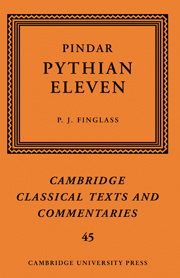COMMENTARY
Published online by Cambridge University Press: 05 August 2015
Summary
1–16 Pindar's odes often begin with an apostrophe, which ‘generally … has a clearly perceptible relationship to the victor or to the poet's celebration of the victory’ (Henry on N. 8.1–5, providing an annotated list). In this case the poet calls upon local divinities from the victor's homeland, as at O. 14, where he invokes the Charites for a victor from Orchomenus. We hear of Cadmus, Semele, Ino, Alcmene, Heracles, and Ismenus (or rather, the Ismenium). Several of these are also found in the two other Pindaric poems which open with a strongly Theban theme: fr. 29 S–M (Hymn 1), which suggests Ismenus, Melia, Cadmus, the Spartoi, Thebe, Heracles, Dionysus, and Harmonia as possible subjects for song; and I. 7, which asks Thebe whether she delighted most in Dionysus, Alcmena, Heracles, Tiresias, Iolaus, the Spartoi, the defeat of the Seven against Thebes, or the Theban colonisation of part of the Peloponnese. But Pythian Eleven avoids the list effect found in these other openings, owing to the greater variety with which it introduces these Theban figures (see further below).
The invocation shows various features of a cletic hymn, or one which summons a divinity to come to the worshipper (cf. 1 n. bis, 3n., 4–6n.). This too is often found at the beginning of Pindaric odes (cf. Meyer (1933) 54–64, Race (1990) 102–3 n. 47, (1992) 30 n. 56, Sevieri (1997) 84–5). But here the form is applied with only a light touch. There is no elaborate praise of Semele and Ino, and only the barest recollection of their attributes. Nor are the heroines asked to give assistance to Thrasydaeus (or the poet), but simply to celebrate his victory. The nod to hymnic form lends grandeur to the opening; but its brevity and unobtrusiveness allow the focus to move quickly to Thrasydaeus himself.
- Type
- Chapter
- Information
- Pindar: 'Pythian Eleven' , pp. 71 - 126Publisher: Cambridge University PressPrint publication year: 2007



